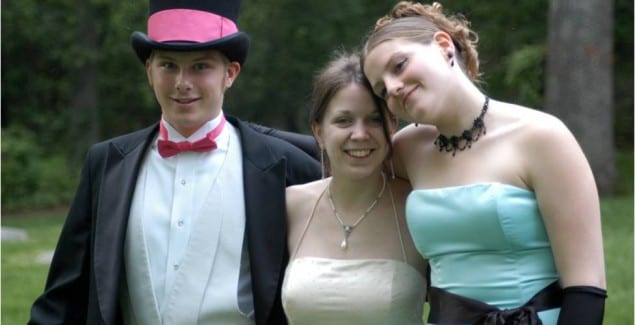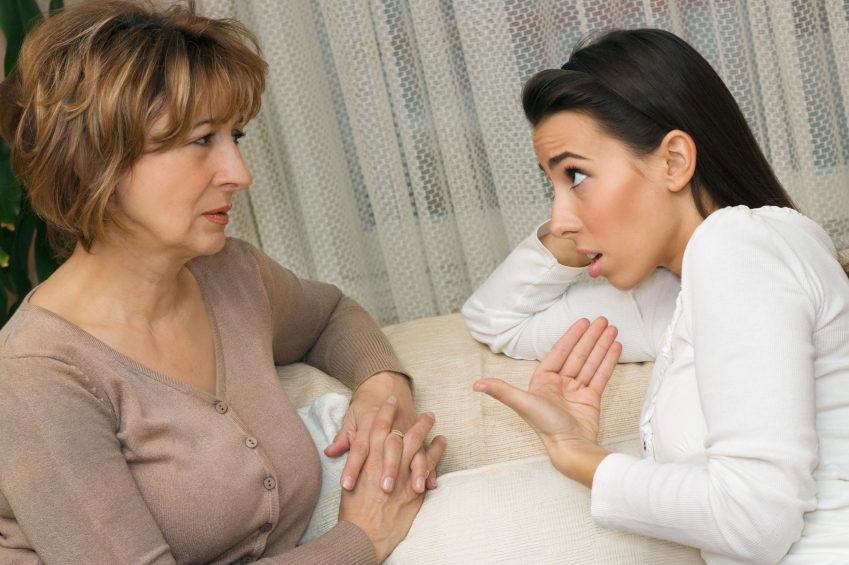The Senior Prom: A Joyous Rite Of Passage Or Nightmare For Parents?

Posted in: Hot Topics, Multimedia, Podcast, Teenagers
Topics: Child + Adolescent Development, Hot Topics
Intro music written and performed by Dr. Gene Beresin.
Outro music performed by Dr. Gene Beresin.
It’s the weekend before your kid’s senior prom. You and your wife are having a typical evening at home, perhaps watching a movie with your youngest daughter. And, there’s a kind of tense silence you remember all too well.
The senior prom.
We all remember it.
Your son ambles downstairs and into the room, begging with his eyes for approval. Your younger daughter is sitting nearby.
She giggles.
“What’s that thing he’s wearing?” she asks.
“That’s a tuxedo,” you say. She ponders your answer for a moment.
“I know what that is, Daddy, but what’s that big black belt?”
She stares at her brother as he aimlessly pulls on his cummerbund, trying to make it feel more normal.
“It’s a cummerbund,” you reply, knowing this will likely yield further inquiries.
But you’re wrong. She has already made up her mind.
“It’s morantic,” the little one says. “I think he looks morantic.”
That’s how she says romantic. You and your wife crack up, but refuse to correct her.
Your son scowls.
“You look handsome. Very distinguished,” your wife chimes in. He is not pleased. He should have said something suave—a barb that would really get you guys going, such as “I do prefer it shaken, not stirred.” But 007 is not on his radar, though he is secretly thinking about how to smuggle the vodka he stashed away a couple of weeks ago into the event. And, that’s just what’s causing some of your own anxiety. What IS he going to do that could really be a problem?
And he’s still not pleased. He’s 18, after all. He’s not ready to be distinguished.
But still, he does look “morantic.” And so does his date. They’re playing dress-up now, strutting around your yard with other elaborately-dressed friends. They’re preparing themselves for “the big night,” one that you think can’t possibly live up to their expectations.
Because that’s really what prom is for: it helps us, with the best of intentions, get used to our failed expectations. We have yet to hear anyone say that the prom was perfect. Usually the stories of romantic mishaps and awkward waltzes are much more appealing in the forgiving spotlight of your shared and personal memories.
And don’t forget the potentially abrupt sharp turn that can separate the glamour of the dance itself from the debauchery of the post-prom festivities. No dress-up clothes now, no contrived formalities…just hanging out with friends and staying up all night—if you can. This is, of course, a source of genuine consternation. Will the post-prom experience be remembered for cut-loose celebrations, or for nightmares of over-indulgence, ungodly amounts of caffeine and a queasy stomach that refuses to give yield?
Ask around. Parents rarely wring their hands about the dance; it’s the after-party that they fear.
But for both you and your kid, it’s a seminal moment—much like a bar mitzvah, confirmation, or graduation. Such times are laced with hopes, high expectations, misunderstandings and tensions, and are symbolic of a kind of metamorphosis (hopefully not one that’s Kafkaesque, but rather on that’s transformative). Looking back in the big scheme of things, they’re just passing moments in time—not all that important in the long run.
So, for all those parents out there who are planning to launch their own poor kids into this great Western tradition, we would like to opine from our vantage points as child and adolescent psychiatrists, former prom attendees and, for at least one of us, a parent who has seen four kids attend three separate proms. Each one is unique in some ways, but all have one thing in common—intense anxiety in the face of unpredictable and unexpected mishaps.
From this iterative knowledge, we think we can comfortably assume some basic rules, first for the prom itself, and then for the after-prom. We hope that these rules make those cummerbunds and sequins that much more palatable by the end of the night.
- When your daughter emerges in her prom dress, don’t fuss. Tell her that she looks beautiful, but don’t tell her that she looks sexy. This isn’t a steadfast rule, but we’re confident when we theorize that most girls want neither their mothers nor their fathers telling them that they’re hot.
- If your kid’s date is a boy, be kind. He’s really nervous. He’s been rehearsing this night for the past three years, and he’s still not sure what to do. He has no template other than his friends’ or older brother’s horror stories and a few bad movies. Secretly he’d like it all to go like High School Musical, but then again, nothing in life goes like High School Musical. Shake his hand. Treat him like a man. And, if you choose to say that you expect him to be safe with your daughter, remember that he expects you to say this. Hopefully it goes without saying; a simple smile and nod will do.
- If your child is a boy, hold back from helping him with the vagaries of a tuxedo. Like tying his shoes, he’ll feel better if he can master it all on his own. Maybe he can enlist the help of one of his buddies or an older sibling. Still, if he emerges “ready” but nonetheless sporting a glaring error, gently offer to fix things for him. If he refuses, so be it. Prom is all about agency. You’re just riding shotgun.
- If a corsage is involved, count to ten before helping. Corsages are deceptively complicated, and if it’s the pin-on variety, the added threat of drawing blood doesn’t help. Still, this is all part of the ritual. Count to ten, and then offer to help if help is still needed. When offering, say something like:
“These things sure are tricky.”
Don’t say:
“I remember pinning this on my date. Wooo, what a night! But then, you don’t want to hear about that.”
You’re right. They don’t want to hear about that. This is their night.
- There may be controversies with this recommendation, but take photos even if your kid prefers that you didn’t. Most kids and their dates want a photo, even if they say they don’t. And, they really love to see them when they’re older! Remember what it’s like to look at your high school yearbook? We love paying tribute to the gangly bygone fashions that a good prom photo can bring to the moment. On this one, she will thank you later.
Now for the really tough stuff: what to do about the post-prom festivities.
“Hey Dad, can we have the post-prom party here? We’ll take everyone’s car keys. It’ll be super-safe.”
You frown. At face value, this is a reasonable question. You talk with your wife. OK, maybe it would be safer at home. Maybe you would be better monitors then someone else’s parents. Maybe your kid can set an example.
But do you really want to host the post-prom party? Do you really want to face party-crashers? Do you really want to walk into a crowd of unruly teenagers and ask some loudmouth to keep it down? Do you really want to be in the position of escorting someone out of your house? To take someone’s keys?
No way.
No parent in his or her right mind should do this. The past practice of “social hosting,” when parents either provided alcohol or turned a blind eye, assuming it safer for their kids to party at home, is clearly against the law. While you may think it better to have your kid and his friends under your watchful eye, you are potentially facing serious legal charges if you go this route.
Some parents did this back in the old days, and like many life experiences, chalked it up to another one of life’s “near misses.” But, times have clearly changed. Just Google “social hosting” and marvel at the number of DAs who won’t hesitate to press charges. You don’t want or need that kind of trouble.
You might think it’s only a matter of months before your kid is off to college and free to do whatever he pleases, but keep in mind that you are the role model; kids really do watch and learn from your example. And, if you think prom worries are huge, remember that this is just one night—not four years of college angst!
These are, of course, very tough decisions. Usually the pre-arranged post-prom parties with designated chaperones are the safest bet. You can volunteer for that if you’re brave enough, though doing so will probably elicit that “whatever” eye roll from your progeny.
And don’t fool yourself. Even if a monitored post-prom party is taking place, there is still plenty of room for trouble and upset.
For the post-prom party:
- Remember at the end of the day that you are the parent or guardian. Tell your kid to have fun and be careful—this means addressing with her sex, drugs and rock ‘n roll. Be direct, and let her know that you’re counting on her to be safe, to be responsible for her date and friends. Expect the eye roll; it’s totally understandable.
- Let him use the hopefully sensible prohibitions that you issued during the pre-prom lectures (we all need to do this, even though it will appear that he’s not listening). In other words, step up to the plate and be willing to let him use you as the bad guy. You want to be able to advise him what to say under whatever nasty peer pressure he encounters. You want him to say: “I would totally do [fill in the blank here with a stupid adolescent thing he’ll possibly regret later in a big way], but my dad/mom/uncle, etc. will kill me.”
- Finally, help her feel special. The particularly dark social side of the prom is the way this event can starkly accentuate differences in socioeconomic capacities, emotional abilities, sexual preferences and, well, the ability to feel special. In fact, most of the academic writing about proms talks a lot about these details. Regardless of your knowledge that the night will likely not live up to her expectations, don’t let on. Like the fact that the Tooth Fairy doesn’t exist, this she must discover on her own.
- Bite your tongue, say goodbye, and walk him to the door. Don’t stand there waving (for too long, anyway).
- Watch Grease or Napoleon Dynamite while you wait. Both have some pretty good prom scenes…
A version of this post originally appeared and was written by the authors (Schlozman and Beresin) on WBUR’s CommonHealth.

 Share
Share Tweet
Tweet






